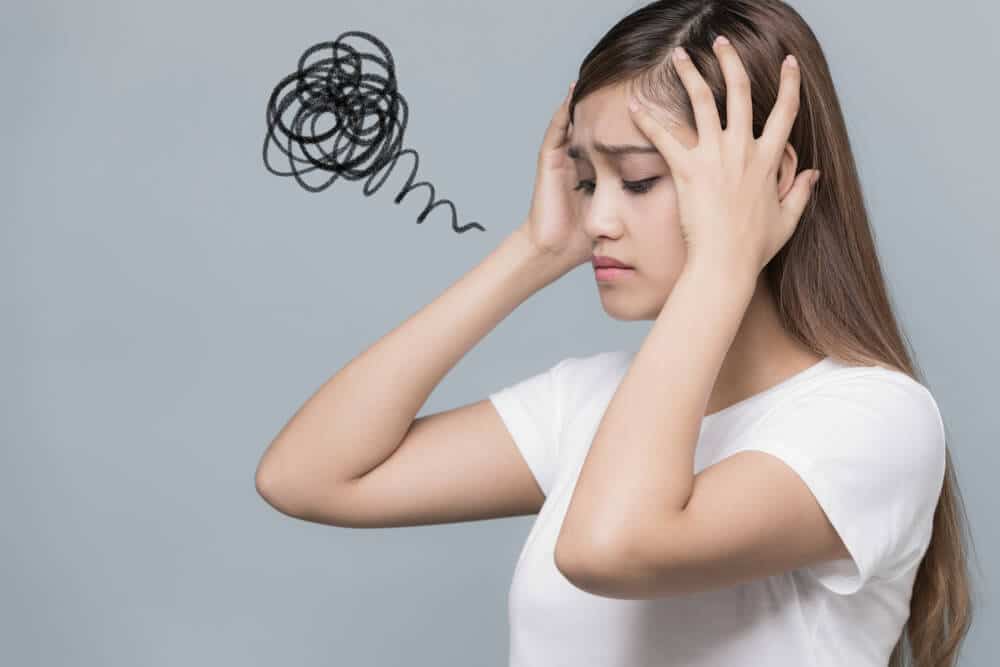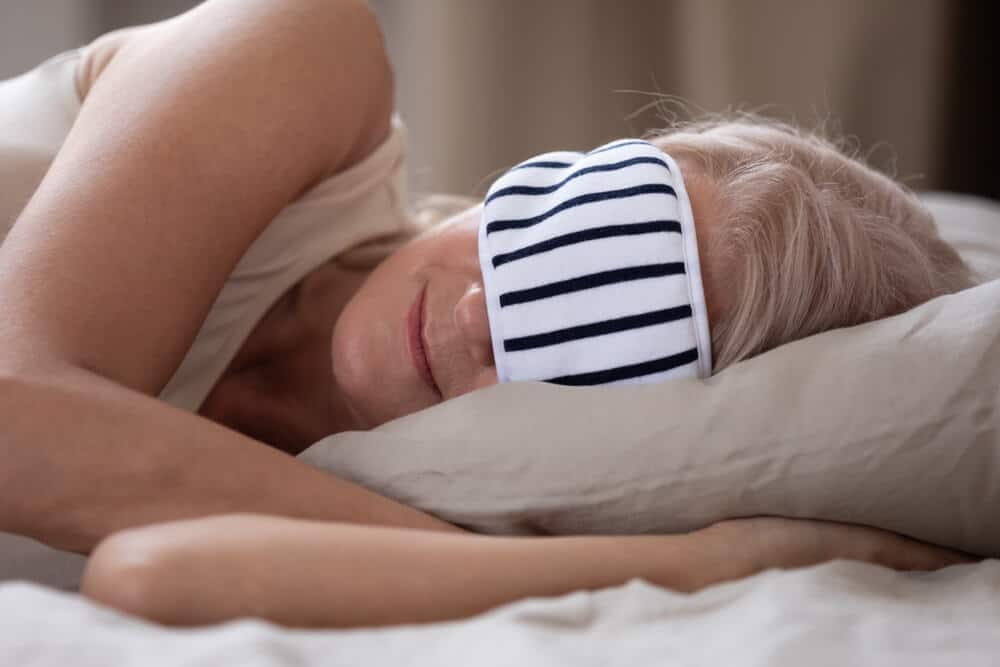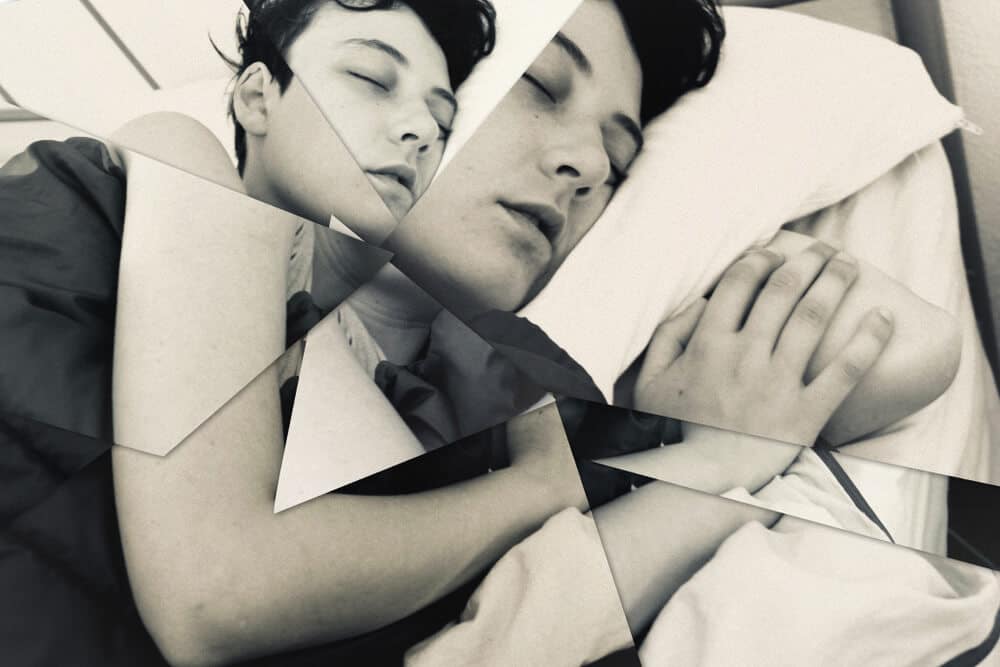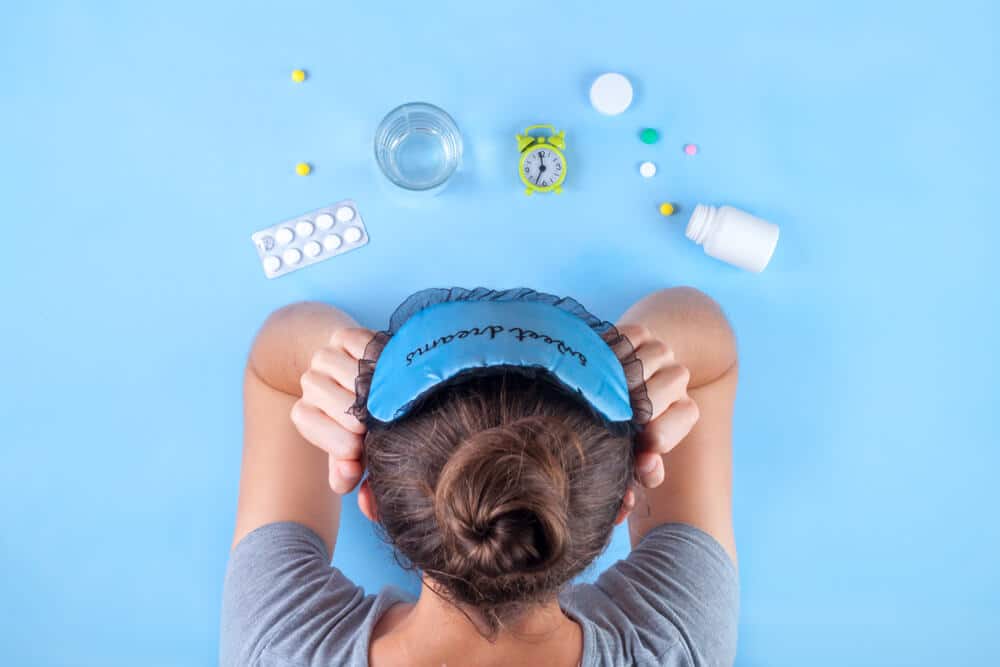If you or a loved one is experiencing a mental health crisis, you can contact the National Suicide Prevention Lifeline at 1-800-273-8255. It is free and available 24/7. You can also web chat with someone here.*
Millions of adults in the United States suffer from depression every year.[1] Additionally, about a third of US adults don’t get enough sleep on a regular basis.[2] Clearly, there’s a significant need to address issues relating to both depression and sleep in the States. Instead of just treating one or the other, though, people with comorbid, or coexisting, depression and sleep disturbances may benefit from a double-pronged approach. In other words, research says an effective treatment plan seeks to alleviate symptoms of both conditions.
To understand why a two-way approach may work best, its important to understand the relationship between depression and sleep disturbances. So, just how exactly do these conditions influence each other? In order to answer that question, we’ll first need to take a closer look at both issues.
Digging into Depression

It’s perfectly normal to experience periods in life of feeling “down” or “having the blues.” Major depression disorder (MDD) isn’t that, though. It’s a serious mental illness that affects millions of people every year. Notably, it can worsen preexisting medical conditions and places someone at a greater risk of suicide.[3]
Symptoms
No one person will experience depressive episodes the same way. However, common symptoms include:
- Extremely low mood
- Intense irritability
- Lack of emotions or feeling “empty”
- Changes in weight and/or appetite
- Decrease in energy levels
- Suicidal thoughts or behavior
- Changes in sleep patterns and/or quality
These symptoms are just a few that someone may experience with MDD or other forms of depression. In order for someone to receive an MDD diagnose, they have to experience symptoms for at least 2 weeks.[4,5]
Risk Factors
The causes of MDD and other mental illnesses are extremely complex. Often, there are often several reasons why someone may experience depressive episodes. Research shows, though, that the following factors place someone at a greater risk of developing MDD:
- Genetic predisposition/family history of mental illness
- Personal history of abuse or neglect
- Chemical imbalances
- Disruptive major life events and/or extreme stress
- Certain medications or interactions
- Another illness or condition
- Issues with sleep quantity and/or quality
- Previous depressive episodes[6,7,8]
How Depression Affects the Body
A lot goes on in the body when depression is involved. The brain, especially, undergoes some significant changes. In depressed individuals, there often are affected levels of certain neurotransmitters, which are certain chemicals that help send signals in the brain. Some of the most prominent neurotransmitters associated with depression? Serotonin, norepinephrine, and dopamine. Namely, research links lower levels of these chemicals with depressive episodes.[9,10]
Cortisol levels are likewise impacted. Now, the adrenal glands produce cortisol. This hormone is involved in many bodily functions; for instance, it helps regulate the sleep cycle. Notably, depressed individuals often show higher levels of cortisol than the general population.[11,12]
It’s not just chemicals and hormones that depression impacts, though. Certain regions of the brain may also be affected. The amygdala, for example, tends to show higher levels of activity in depressed people. Importantly, this part of the brain helps process emotions. The hippocampus, too, is also often different in depressed and non-depressed individuals. This section of the brain is associated with memory, and research shows that women with depression have slightly smaller hippocampi than non-depressed women.[13]
Science of the Sleep Cycle

Ever wonder what happens when we sleep? While we don’t know 100% how or why we need rest, we do still have a general idea of what happens when we catch some shut-eye. To understand rest (and sleep disorders), it’s important to know about sleep cycles.
Stages of Sleep
A sleep cycle is a roughly 90-minute period, and a full night of rest involves 4 or 5 completed cycles. This cycle is composed of alternating periods of slow-wave sleep (SWS), rapid eye movement (REM), and brief awakenings. SWS (also known as non-REM or NREM sleep) is itself comprised of 3 separate stages. Progressing into SWS entails physical changes like slowing brain waves. Meanwhile, REM is the period where we experience the most dreams, and it involves lots of activity in the amygdala.[14]
Naturally, various chemicals and hormones play a large role in regulating this cycle. REM, for instance, requires the presence of the neurotransmitter acetylocholine and little to no histamine, serotonin, or norepinephrine.[15] Cortisol likewise plays a significant role in regulating the sleep cycle. Specifically, cortisol levels are low when first entering the sleep cycle. After a few hours of healthy rest, cortisol levels start to rise. This increase continues past wakefulness into mid-morning. Then, cortisol levels start to drop throughout the day and into the night.[16]
How Insomnia Affects the Body
High sleep quality and good sleep-based habits (sleep hygiene), is incredibly important for leading a healthy lifestyle. Conversely, poor sleep quality or lack of rest can increase some serious health risks.[17] Disturbed sleep can involve not getting enough rest or not experiencing quality rest (insomnia) or getting way too much rest or feeling excessively drowsy during the day (hypersomnia). Both can negatively impact someone’s overall well being.
Insomnia, particularly, is linked to some serious issues. For starters, those with this condition are at a higher risk of developing mental illnesses like depression. Plus, those who struggle with sleep after recovering from depressive episodes are more likely to relapse. Worst of all, though, is the fact that insomnia increases the risk of suicide.[18,19]
Like those with depression, insomniacs tend to show elevated levels of cortisol.[20] While cortisol is important, having too much or too little of it can disrupt lots of bodily processes. For example, high levels of cortisol can interfere with not just sleep, but also one’s metabolism, digestion, and concentration.[21] So, insomnia can affect not just someone’s mental health, but their physical health, too.
How Strong is the Connection Between Depression and Sleep?

There’s no denying the strong connection between depression and disturbances in sleep. Not only can depression create or exacerbate sleeping issues, but those with sleep issues are more likely than the general population to develop depression.[22] In fact, significant changes in sleeping patterns are a major indicator of depression. Both insomnia and hypersomnia can be symptoms of this mental illness.[23,24]
The relationship between sleep and depression only deepens from there. Those with depression who have either insomnia or hypersomnia are at increased risks of suicide and relapsing.[25,26,27] In fact, research shows that those who alleviate most or all of their depressive symptoms except for sleep issues are still at an increased risk of relapsing.[28]
Given the similarities in physiology between those with depression and insomnia, the link between the two should come as no surprise. After all, both involve disruptions in brain activity and hormone levels, which may make it easier for one of these conditions to worsen the other.
Antidepressants and Sleep
Sometimes, the treatment of depression may actually create or worsen sleeping problems if antidepressants are involved. Specifically, medications like SSRIs or SNRIs are known for disrupting the sleep cycle. SSRIs (selective serotonin reuptake inhibitors) and SNRIs (serotonin-norepinephrine reuptake inhibitors) are classes of antidepressants that inhibit the reuptake, or reabsorption, of serotonin and norepinephrine in the brain. That means that these chemicals stay in the system for longer. Why? So that the brain has enough time to properly bind these neurotransmitters to certain receptors, which may alleviate symptoms of depression and anxiety.
So, how can these drugs disrupt sleep? It all goes back to the chemical requirements of the sleep cycle. REM, for example, needs low or nonexistent levels of certain neurotransmitters in the brain, including serotonin and norepinephrine. Due to the nature of reuptake inhibitors, these chemicals stay in the brain for extended periods of time, which may interfere with sleep in the evening.
A Two-way Approach to Treatment?

The causes of insomnia and depression vary by individual. Naturally, that means that treatment will vary by individual, too. Research, however, suggests treatment for both depressive symptoms and insomnia simultaneously can produce more effective results than working on just one or the other. Tactics many people have found helpful include:
Seeking Professional Help
First and foremost, it’s important to seek out a specialist to help with these issues. Together, you can work on crafting a treatment plan catered to your unique situation. You can go here for help finding therapy and here to discover low-cost treatment options in your area.
Cognitive behavioral training (CBT) might be of particular use. CBT is a structured form of therapy to help patients learn how to better manage behavior and emotions. It can be an effective treatment for those with either insomnia or MDD. Research, though, shows that CBT can get a little complicated for comorbid cases. Interestingly, studies claim that CBT for primary insomnia may improve not just sleeping conditions, but also other symptoms of MDD. Those who received CBT for MDD only, though, did not notice improvement with their insomnia.[29]
Switching Drugs
As previously discussed, certain classes of drugs can negatively interfere with rest. If you take an antidepressant like an SSRI, consider talking to your doctor about switching medications. Some people believe that drugs like trazodone may help those with comorbid depression and insomnia.[30] Why? Because this antidepressant is well-known for causing drowsiness. So, many doctors unofficially prescribe it to their patients for aiding sleep issues. We say “unofficially” here because the FDA has only approved trazodone for use as an antidepressant, not for insomnia treatment.
Taking Meds in the Morning
Even just changing when you take certain medications may help with your sleep. Remember, SSRIs delay the reabsorption of serotonin, and REM sleep requires the absence of this neurotransmitter. So, taking SSRIs at night can interfere with sleep due to increased levels of serotonin in your system. Taking fast-release medications in the morning may help with this issue. This way, the body may get the benefits of delayed serotonin reuptake (alleviation of depression symptoms) while still getting time to get serotonin levels under control before bedtime.
Exercising
Now, exercise alone is likely not enough to cure both depression and insomnia. However, consistent exercise can still improve sleep quality and symptoms of depression.[31,32] The exercises don’t have to be intense hours-long sessions either; just 20 to 30-minute sessions 5 days a week can bring positive results.[33] So, while exercise alone isn’t a cure, it can still be one piece of an effective treatment plan.
Practicing Breathing Exercises
Mindful breathing isn’t just a meaningless fad; there’s plenty of research supporting the claim that certain breathing techniques can create a relaxed state. This state can make it not only easier to fall asleep, but also to alleviate acute anxiety symptoms.[34,35] Like physical activities, breathing techniques alone aren’t cures. However, many use them as part of a holistic self-care plan.
You can discover some easy-to-follow breathing exercises here. Just remember to talk to your doctor before trying any of these techniques, as they aren’t for everyone.
Final Thoughts

No one solution works for everyone. Research suggests, though, that the key to dealing with comorbid depression and sleep issues involves seeking professional help for both. Only dealing with just one problem or the other can mean an increased risk of relapses for both down the line.
*Disclaimers: This article is not intended to replace the advice of licensed professionals; information provided here should not be used to help diagnose, treat, cure, or prevent any disease or condition. Any health concerns or lifestyle changes must be discussed with a doctor.
Terms
- Amygdala: A region of the brain’s limbic system; the amygdala is associated with processing emotions and emotionally strong memories.
- Cognitive behavioral therapy (CBT): A structured form of therapy for patients to improve their ability to manage their own emotions and behavior.
- Comorbidity: Having at least two medical conditions at the same time.
- Cortisol: A hormone that plays a major role in the sleep cycle; those with insomnia and depression tend to show elevated levels of this hormone.
- Hippocampus: Another part of the brain’s limbic system; it is notably associated with memory.
- Hypersomnia: A condition characterized by excessive sleep.
- Insomnia: A condition characterized by a lack of rest and/or poor quality of rest.
- Major depressive disorder (MDD): A serious mental illness characterized by extremely low mood and a host of other symptoms like sleep disturbances. MDD places someone at a higher risk of suicide than the general population.
- Neurotransmitters: Chemicals that help send signals across the brain.
- Primary insomnia: Insomnia not caused by an underlying condition like mental illness.
- Rapid eye movement (REM): The part of the sleep cycle associated most strongly with dreaming.
- Selective serotonin reuptake inhibitor (SSRI): A class of antidepressants that inhibits the reabsorption of serotonin in the brain.
- Serotonin-norepinephrine reuptake inhibitor (SNRI): Antidepressants that inhibit the reabsorption of serotonin and norepinephrine.
- Sleep Cycle: A 90-minute period composed of SWS, REM, and brief awakenings. Someone typically experiences 4-5 sleep cycles during a full night of rest.
- Slow-wave sleep (SWS): Non-REM (NREM) sleep characterized by physical changes like slower brain waves.
References
[28][19]Ağargün, M.Y., Kara, H., & Solmaz, M. (1997). Sleep disturbances and suicidal behavior in patients with major depression. Journal of clinical psychiatry, 58(6): 249-51. DOI: 10.4088/jcp.v58n0602
[2][17]Centers for Disease Control and Prevention. (2016). 1 in 3 adults don’t get enough sleep [Press release]. Retrieved from https://www.cdc.gov/media/releases/2016/p0215-enough-sleep.html
[31]CDC (2019). Are you getting enough sleep? Retrieved from https://www.cdc.gov/features/sleep/index.html
[32]CDC. (2018). Physical activity facts. Retrieved from https://www.cdc.gov/healthyschools/physicalactivity/facts.htm
[33]CDC. (2015). Physical activity for a healthy weight. Retrieved from https://www.cdc.gov/healthyweight/physical_activity/index.html
[21]Chang, L. (Reviewer). (2018). What is cortisol. WebMD. Retrieved from https://www.webmd.com/a-to-z-guides/what-is-cortisol#1
[4][6][9][11][13]Harvard Health Publishing. (2019). What causes depression? Retrieved from https://www.health.harvard.edu/mind-and-mood/what-causes-depression
[16][20]Hirotsu, C., Tufik, S., & Andersen, M. L. (2015). Interactions between sleep, stress, and metabolism: From physiological to pathological conditions. Sleep science (Sao Paulo, Brazil), 8(3), 143–152. doi:10.1016/j.slsci.2015.09.002
[35]Jerath, R., Beveridge, C., & Barnes, V. A. (2019). Self-Regulation of Breathing as an Adjunctive Treatment of Insomnia. Frontiers in psychiatry, 9, 780. doi:10.3389/fpsyt.2018.00780
[30]Jindal, R.D., & Thase, M.E. (2004). Treatment of insomnia associated with clinical depression. Sleep medicine reviews, 8(1):19-30. PMID: 15062208
[26]Manber, R., Edinger, J. D., Gress, J. L., San Pedro-Salcedo, M. G., Kuo, T. F., & Kalista, T. (2008). Cognitive behavioral therapy for insomnia enhances depression outcome in patients with comorbid major depressive disorder and insomnia. Sleep, 31(4), 489–495. doi:10.1093/sleep/31.4.489
[22][25][12][18]Murphy, M. J., & Peterson, M. J. (2015). Sleep Disturbances in Depression. Sleep medicine clinics, 10(1), 17–23. doi:10.1016/j.jsmc.2014.11.009
[23][3][5][7]National Institute of Mental Health. (2018). Depression. Retrieved from https://www.nimh.nih.gov/health/topics/depression/index.shtml
[1]NIMH. (2019). Major depression. Retrieved from https://www.nimh.nih.gov/health/statistics/major-depression.shtml
[14]National Institute of Neurological Disorders and Stroke. (2019). Brain Basics: Understanding Sleep. Retrieved from https://www.ninds.nih.gov/Disorders/Patient-Caregiver-Education/Understanding-Sleep
[24][27]Nutt, D., Wilson, S., & Paterson, L. (2008). Sleep disorders as core symptoms of depression. Dialogues in clinical neuroscience, 10(3), 329–336. PMCID: PMC3181883
[34]Russo, M. A., Santarelli, D. M., & O’Rourke, D. (2017). The physiological effects of slow breathing in the healthy human. Breathe (Sheffield, England), 13(4), 298–309. doi:10.1183/20734735.009817
[8][10][29]Thase M. E. (2006). Depression and sleep: pathophysiology and treatment. Dialogues in clinical neuroscience, 8(2), 217–226. PMCID: PMC3181772
[15]Watson, C. J., Baghdoyan, H. A., & Lydic, R. (2010). Neuropharmacology of Sleep and Wakefulness. Sleep medicine clinics, 5(4), 513–528. doi:10.1016/j.jsmc.2010.08.003


